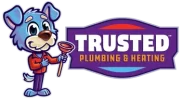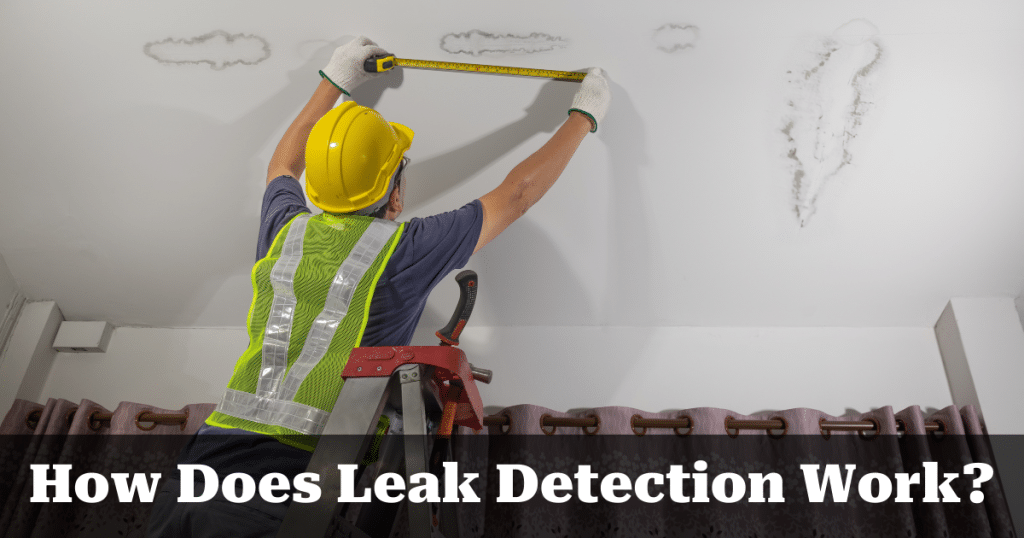A leak in the plumbing system can cause significant damage if left undetected. This is when leak detection technology comes in to save the day. But how does leak detection work? Let’s dive in and discover the interesting mechanism behind this superhero-like technology.
Leak detection specialists use a variety of innovative instruments and procedures to determine the exact location of a leak, even if it is hidden beneath your floor or behind a wall. To accurately detect leaks, these professionals use specialized equipment such as infrared cameras, acoustic listening devices, and gas tracing systems.
By incorporating cutting-edge technology, leak detection services can save homeowners from costly repairs and water damage. Early detection not only helps to prevent additional damage to your property, but it also conserves one of our most valuable resources: water.
Common Types of Leaks
Leaks can occur in various parts of your plumbing system, so it’s essential to understand the common types of leaks that can cause property damage. Tap leaks are among the most common sorts of leakage. A dripping faucet may appear to be a minor issue, but it can waste a lot of water over time. Other common types of leaks are toilet leaks, pipe leaks, and underground leaks.
Faucet leaks often occur due to worn-out washers or faulty seals. Toilet leaks can be caused by a faulty flapper, a defective fill valve, or a loose connection. Pipe leaks can result from corrosion, high water pressure, or poor installation. Underground leaks are usually caused by damaged pipes due to shifting soil or tree roots.
It’s important to be aware of these common types of leaks so that you can promptly address any signs of leakage and seek professional leak detection services if needed.
Signs of a Leak
Detecting a leak early on can save you from costly repairs and prevent further damage to your property. Knowing the signs of a leak can help you identify potential problems before they escalate. Some common signs of a water leak include:
- Unexplained increase in water bills: If you notice a sudden spike in your water bills without any changes in your water usage, it could be an indication of a hidden leak.
- Damp areas: If you come across damp spots on your walls, ceilings, or floors, it could be a sign of a hidden leak. These areas may feel cool to the touch or have a musty odor.
- Mold or mildew growth: Excessive moisture from a leak can promote the growth of mold and mildew. If you notice mold or mildew in areas that are usually dry, it could indicate a hidden leak.
- Low water pressure: A sudden drop in water pressure in your faucets or showerheads could be a sign of a leak. The leak may be affecting the water flow, leading to reduced pressure.
- Sounds of running water: If you hear the sound of water running even when all faucets and appliances are turned off, it could indicate a hidden leak.
Benefits of Early Leak Detection
Early leak detection offers several benefits for homeowners. First and foremost, it allows for timely repairs, preventing further damage to your property. By addressing a leak early on, you can avoid costly repairs that may be required if the leak is left undetected for an extended period.
Additionally, early leak detection helps conserve water, which is crucial in times of water scarcity. Water leaks can waste a significant amount of water over time, and by detecting and repairing leaks promptly, you can contribute to water conservation efforts.
Moreover, early leak detection can help prevent the growth of mold and mildew. Excessive moisture from leaks can create an environment conducive to mold and mildew growth, which can be harmful to your health. By detecting and addressing leaks early, you can maintain a healthy living environment for you and your family.
Methods and Technologies Used in Water Detection
Leak detection specialists employ various methods and technologies to accurately locate leaks, even if they are hidden from plain sight.
Water Leak Detectors include:
- Infrared cameras: Infrared cameras are highly effective in detecting leaks behind walls, under floors, or beneath concrete slabs. These cameras detect temperature differences caused by the presence of water, allowing the specialists to pinpoint the exact location of the leak.
- Acoustic listening devices: These devices are used to listen to the sound of water escaping from pipes or other plumbing fixtures. By amplifying the sound of the leak, specialists can determine its location.
- Gas tracing systems: Gas tracing systems involve injecting a harmless gas into the plumbing system. This gas then escapes through the leak and can be detected using specialized equipment. This method is particularly useful for locating underground leaks.
- Pressure testing: Pressure testing involves increasing the pressure in the plumbing system to identify any significant drops, which can indicate the presence of a leak. This method is commonly used for identifying leaks in pipes.
Step-by-Step Process of Leak Detection
The process of leak detection typically involves the following steps:
- Initial assessment: The leak detection specialist will conduct an initial assessment of the plumbing system to gather information about the potential sources of the leak. This may involve reviewing water bills, inspecting visible pipes, and listening for any audible signs of a leak.
- Non-invasive detection: Using non-invasive techniques such as infrared cameras and acoustic listening devices, the specialist will search for signs of a leak without causing any damage to the property. This step helps narrow down the search area and identify potential problem areas.
- Invasive detection: If the non-invasive techniques do not reveal the exact location of the leak, invasive detection methods may be necessary. This may involve cutting into walls or floors to access the plumbing system and visually inspecting the pipes for signs of leakage.
- Confirmation and repair: Once the leak has been located, the specialist will confirm the findings and provide a detailed report to the homeowner. Based on the severity of the leak, repair options will be discussed, and necessary repairs will be carried out to fix the issue.
DIY vs Professional Leak Detection Services
In some circumstances, homeowners may attempt to discover leaks on their own using DIY methods such as listening for hissing sounds or inspecting for wet areas. However, these procedures are not always dependable and can produce incorrect results.
Professional leak detection services employ highly trained specialists with access to cutting-edge equipment and technology. This enables them to properly spot leaks and give effective remedies while avoiding further damage to the plumbing system.
Furthermore, expert leak detection services provide monthly maintenance inspections and can discover possible problems before they escalate into costly repairs. This not only saves money in the long run, but also ensures that your plumbing system runs smoothly at all times.
While DIY solutions may appear to be a cost-effective alternative, it is always preferable to seek expert assistance with leak detection. Professionals use specialized technology and knowledge to locate and resolve leaks quickly and efficiently, saving you time, money, and water. Don’t wait for a little leak to become a large one; instead, contact a leak detection specialist today to maintain your plumbing system in good working order.
Fix Your Leak Today
Trusted Plumbing & Heating is a professional leak detection company that offers top-notch services to homeowners and businesses. Our team of experienced specialists uses cutting-edge technology to accurately detect leaks and provide efficient solutions. Don’t wait for a small leak to turn into a major problem – contact us today and let us help you keep your plumbing system in top condition!
Fix your leaks now before they become bigger problems tomorrow!


